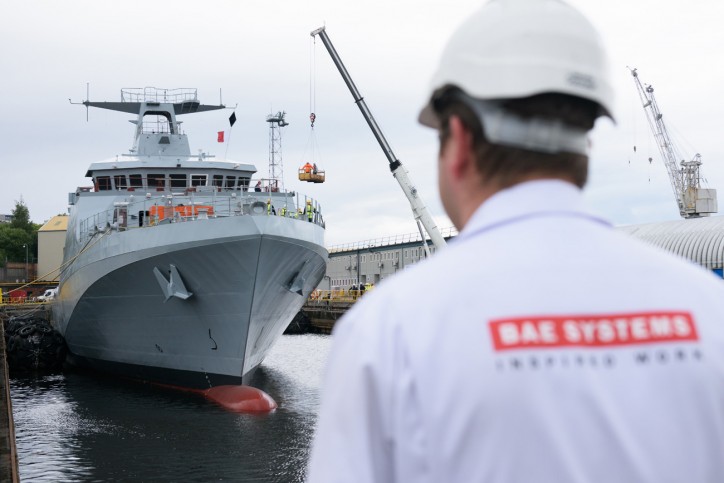The first of the Royal Navy’s new style of River-class offshore patrol vessels has entered the water for the first time.
Forth completed her 1¾-mile journey from BAE Systems shipyard at Govan on the Clyde to the company’s Scotstoun site.
The first plate of steel was delivered to Govan in October 2014, with the ship structurally complete 18 months later.

Image courtesy: Royal Navy
Forth will now be fitted with her systems and undergo testing at Scotstoun before being handed over to the Royal Navy in 2017.
“The cutting-edge technology of the Royal Navy’s versatile new offshore patrol vessels will enable these warships to carry out a wide range of tasks, from disaster-relief missions to maritime security,” said Vice Admiral Simon Lister, Chief of Material (Fleet) for Defence and Equipment and Support.
“Supported by a rising Defence budget, the rollout of HMS Forth reflects the success of the OPV programme, safeguarding the vital capability and skills that will be used in the delivery of the Royal Navy’s Type 26 frigates.”
“The cutting-edge technology of the Royal Navy’s versatile new offshore patrol vessels will enable these warships to carry out a wide range of tasks, from disaster-relief missions to maritime security”, said Vice Admiral Simon Lister
A 160-wheeled flat bed low-loader, which is operated by remote control, transported Forth from the shed where she was built on to a special barge which ferried Forth downstream at a mere half a mile per hour.
The patrol ship, which weighs 1,600 tonnes – the equivalent of 120 London buses – was then lowered into the water, with the barge beneath it, for fitting out at BAE’s Scotstoun yard.
Forth will be followed by Medway and Trent. The ships will have a range in excess of 5,000 nautical miles and travel at a maximum speed of 24 knots.
Iain Stevenson, Managing Director at BAE Systems Naval Ships, said: “She is the first complex warship to benefit from the new technologies and methods that we are introducing to further bolster our ability to be the best supplier to the Royal Navy.
“Forth has already benefitted from a safer and more efficient build process that enabled much of the work to take place under cover, and as a result she leaves our Govan facility at a much higher rate of completion.”
Source: Royal Navy